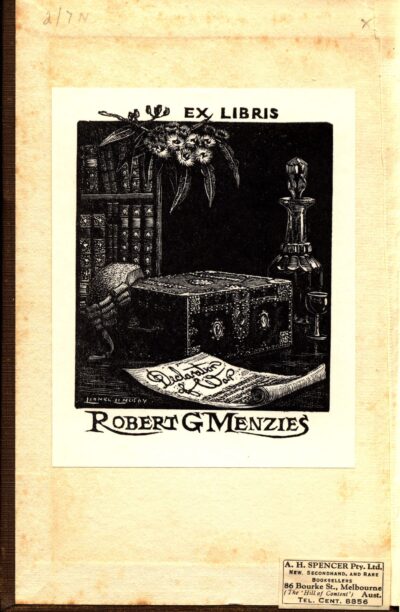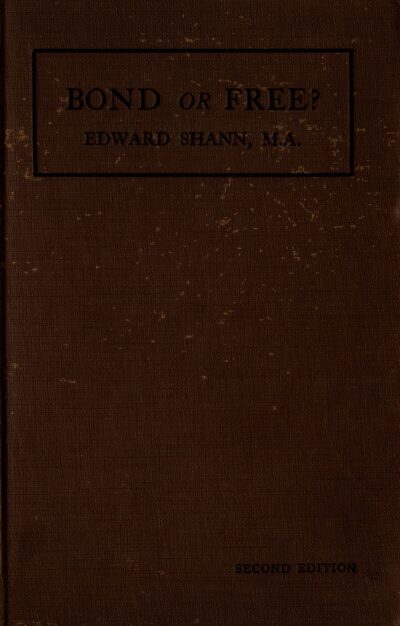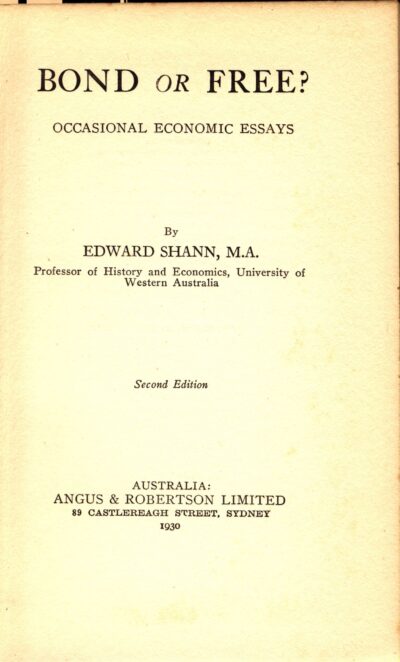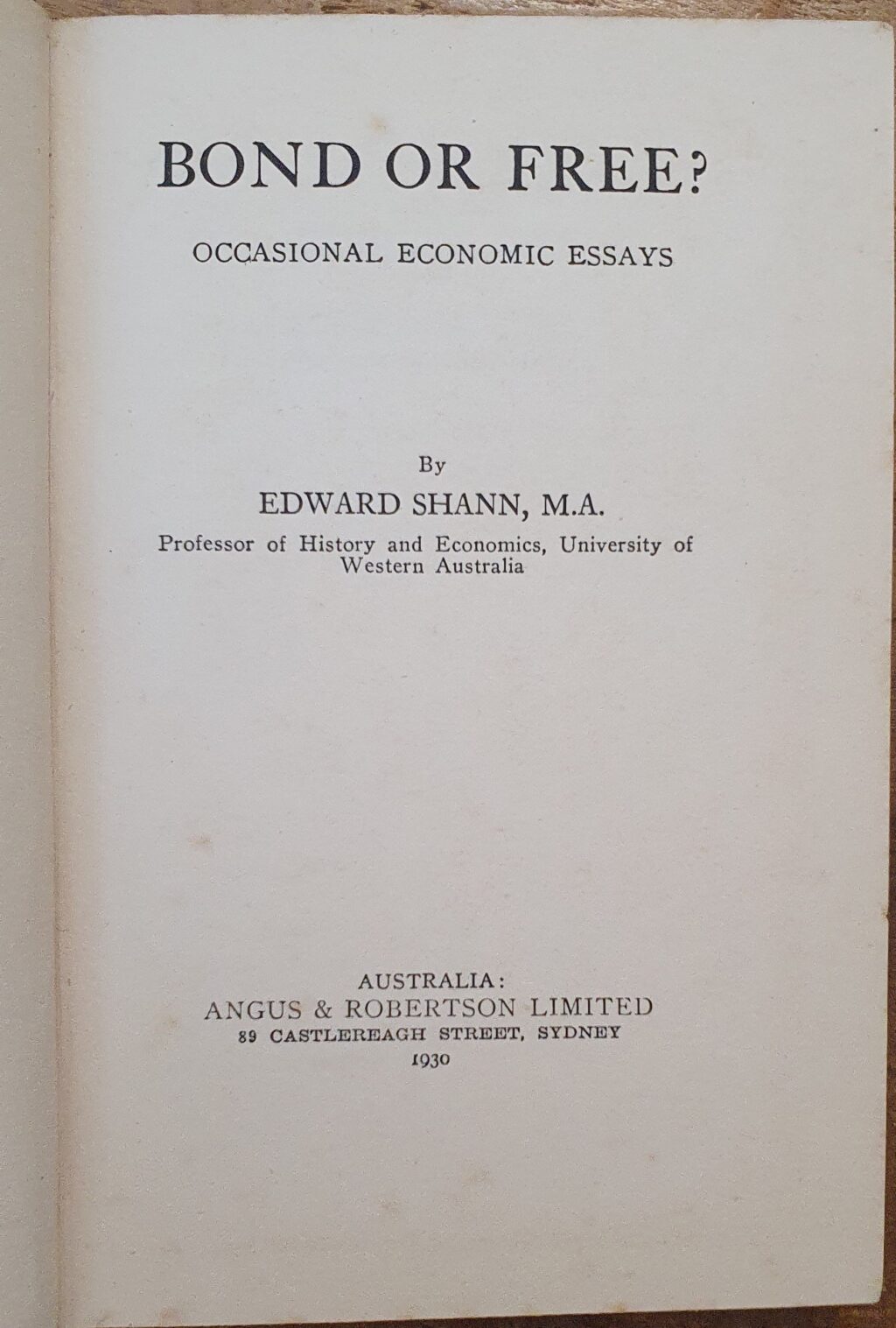Edward Shann, Bond or Free? Occasional Economic Essays (1930)
Edward Owen Giblin Shann was a leading Australian economist, now best remembered as an early and forceful critic of the ‘Australian Settlement’ and an advocate for economic liberalisation.
Born in Hobart in 1884, Edward’s mother abandoned the family when he was very young and his father subsequently took Edward and his three siblings to live in Victoria. There he attended Wesley College and the University of Melbourne, despite the severe impact of the 1890s depression which forced Edward to rely on scholarships and the financial assistance of his brother to complete his education.
Shann topped his class and graduated with first-class honours in history and political economy, and was soon serving as temporary lecturer in constitutional history at his alma mater, before taking up a position as acting professor of philosophy at the University of Adelaide in 1906. In September 1908 Shann left for the London School of Economics, where he became ensconced in the intellectual culture of the bustling city at the heart of the Empire. He returned with a belief in ‘rational’ socialism, and while he later abandoned this for what critics dubbed laissez-faire, he nevertheless maintained ‘a strong sense of social responsibility’.
After some time spent lecturing at the University of Queensland, Shann became foundation professor of history and economics at the University of Western Australia where he is still commemorated. There he began writing innovative economic histories, including The Boom of 1890—and Now in 1927 and his seminal work An Economic History of Australia in 1930. He was involved in the Copland Committee which helped to formulate Australia’s response to the Great Depression, giving the Premiers’ Plan ‘a classical liberal edge’, and he attended the Ottawa Conference on imperial preference where he advocated for flexible exchange rates and freeing up trade – both of which were very much at odds with the Deakinite views then prevalent in Australia. He also taught and influenced many significant Australians, including John La Nauze, ‘Nugget’ Coombs, Merab Harris, Paul Hasluck, Arthur Tange and Alexander Reid.
After being subject to the negative lobbying of John Curtin and other Labor figures who disliked his economic viewpoint, Shann decided to leave Perth and accept the chair of economics at the University of Adelaide in 1933. The posting would prove short lived however, as Shann died tragically by apparent suicide in 1935 – though there have long been disputes over the exact cause of death and a 2016 article argues that it was in fact ‘a tragic accident’.
Shann left a considerable legacy in his authored works, the common theme of which was ‘the individual’s struggle against restriction’ and the immense problems that had been caused by Australia’s heavily interventionist state. This was certainly true of Bond or Free? a collection of essays which argued that Australian prosperity required freeing up the economy so that Australia could be a competitive global exporter – something which was essential as the country’s internal market was far too small to be relied upon.
Shann contrasted two ways in which Australia could proceed economically: free enterprise, which accepts the verdict of the market regarding price and hence production or ‘collective action on compulsory lines’. The latter had been a popular ‘short cut’ in Australia since convict times and once governments got involved in this process they did not know where to stop: first railways (which could be justified), but then public works, protection, guaranteed minimum wages, guaranteed minimum prices for producers and exclusion of outsiders. His major complaint was that under this system of ‘economic control’ prices ceased to reflect demand but instead expressed ‘the organised producers’ belief in their own worth to society’. Such prices checked production for export and discouraged industry from looking for new productive and profitable enterprises. The ‘collective, authoritative way’, he concluded, had led to ‘uncontrollable wastes’ and ‘massive debt’ which undermined Australia’s prosperity.
In this vein Shann defended market mechanisms over regulation, the latter of which always had unintended consequences and served to stunt growth and precipitate inflation in a manner that hurt the very people it was meant to help: ‘So far from being a barbarous rule, as Mr Justice Higgins once called it, the higgling of the market is a sanction of economic wisdom more prompt, delicate and potent in its operation than any rewards or penalties that are within the slow reach of an over-burdened judge or commission.’ As the citing of Higgins implies, this was a frontal assault on Australia’s arbitration system and attempts to legislate economic ‘justice’ more broadly. Too often policies had been judged by their intent rather than their result, to the detriment of the nation and its people.
It is difficult to know how closely Menzies read Shann, and his copy of Bond or Free? does not show signs of use as intensive as that other critique of the destructive power of the state F.A. Hayek’s The Road to Serfdom. This is perhaps because of Shann’s more exclusive focus on economics, which were not Menzies’s chief intellectual interest, even if he did have some grasp of them.
Menzies’s attitude towards the Australian Settlement which Shann railed against is a matter of some debate. Growing up in the Protectionist stronghold of Victoria, Menzies was raised to admire Alfred Deakin and he certainly did not openly confront the central pillars of the Settlement while prime minister. Nevertheless, Menzies was well aware that state intervention could have significant detrimental consequences and frequently stated that individual initiative was ultimately the driver of all real progress. David Kemp has argued that while the Settlement was too entrenched to be dismantled in Menzies’s day, Menzies was not fond of it and was content to let it erode and come under attack. Perhaps if Shann had lived he could have led that attack and given a ‘classical liberal edge’ to Menzies’s policy as he had during the Depression. But as it is, Shann’s importance lies as an early, enduring, and influential critic who helped precipitate the economic reforms of the later 20th century.
You might also like...
Sign up to our newsletter
Sign up for our monthly newsletter to hear the latest news and receive information about upcoming events.






